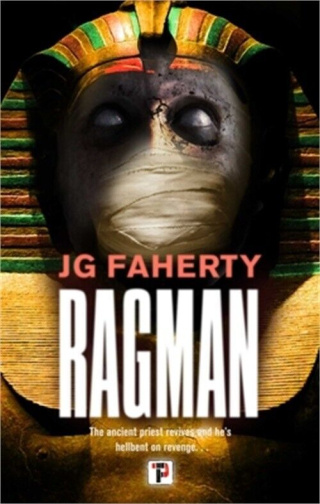
This review was written for The Horrorzine. Special thanks to the author for providing a review copy.
Zombos Says: Good
What is Faherty thinking? He takes the awkwardly slow-moving ancient mummy of Hammer and Universal Studios fame, inhales the plot-thickening of Arthur Conan Doyle’s story, Lot. 249, and wraps a tidy bundle of revenge killings and weird menace that would fit quite naturally into a pulp magazine like Strange Detective Mysteries. On top of this, he adds a unique quality to the mummy’s bandages as they take on a life of their own and wreak bloody havoc: and all this without a tana leaf in sight! Such thinking, hopefully, will lead to more supernatural detective adventures with Reese, Reardon, and one determined forensic scientist, Joanna, who is married to Detective Dan Reese.
And that is where the friction heats up between Detective Reese and drummed-out-of-the-police department, ex-partner, former detective Reardon. Now they are hateful of each other, the only other person more despised, by both of them, is Driscoll, a sloppy, almost-retired to pension slacker, counting the days, just-close-the-books kind of detective messing things up and going for the easy but false answers. The true answer is one they all have trouble wrapping their heads around.
It involves a revengeful mummy resurrected by sucking the life force out of others unfortunate enough to cross his path (leaving people looking like mummies themselves), and another demonic mummy (a ushabti), very tall, very determined, and intent on dismembering those he is summoned to kill. All because a group of men, many years before, betrayed one of their own while stealing sacred artifacts from the Temple of Sokar. Seemingly unstoppable and able to appear out of thin air and return to it, Reese, Reardon, and Joanna are hard pressed to stop it or convince anyone else of what is happening; especially when it is finally directed to go after them.
In between the escalating carnage, the sexual tensions and a sullied past history caused by a strip poker game gone wrong, Reese and Reardon’s ability to work together is skittish at best, and the fumbling Driscoll keeps pushing to close the case with false leads in spite of the facts as the rich descendants of those tomb plunderers wind up in pieces, one at a time.
Joanna uses her forensic connections and skills to dig deeper into the nature of the enemy they are facing: a deadly giant mummy on one hand and its unseen guiding force on the other. They must piece together the why before they can figure out the how, to stop the deaths piling up from an event begun in 1888, now coming to its climax in New York City. When the ushabti goes after people not connected to the original descendants’ curse, matters take a turn for the worse.
Faherty does a wonderful job giving his people everyday problems tossed in with the supernatural ones, making his characters believable and endearing, even when they overstep each other's personal boundaries. His monsters are not too simple, not too complicated, and usually have personal boundary issues too, and here those issues lead to point-blank death or narrow escapes from it. Those death-defying escapes provide the quickly moving action in Ragman, and his villains here, aside from the titular demonic one, have either valid grievances or imagined ones, providing the mystery that pushes Reese, Reardon, and Joanna together again to solve it while staying alive trying.
